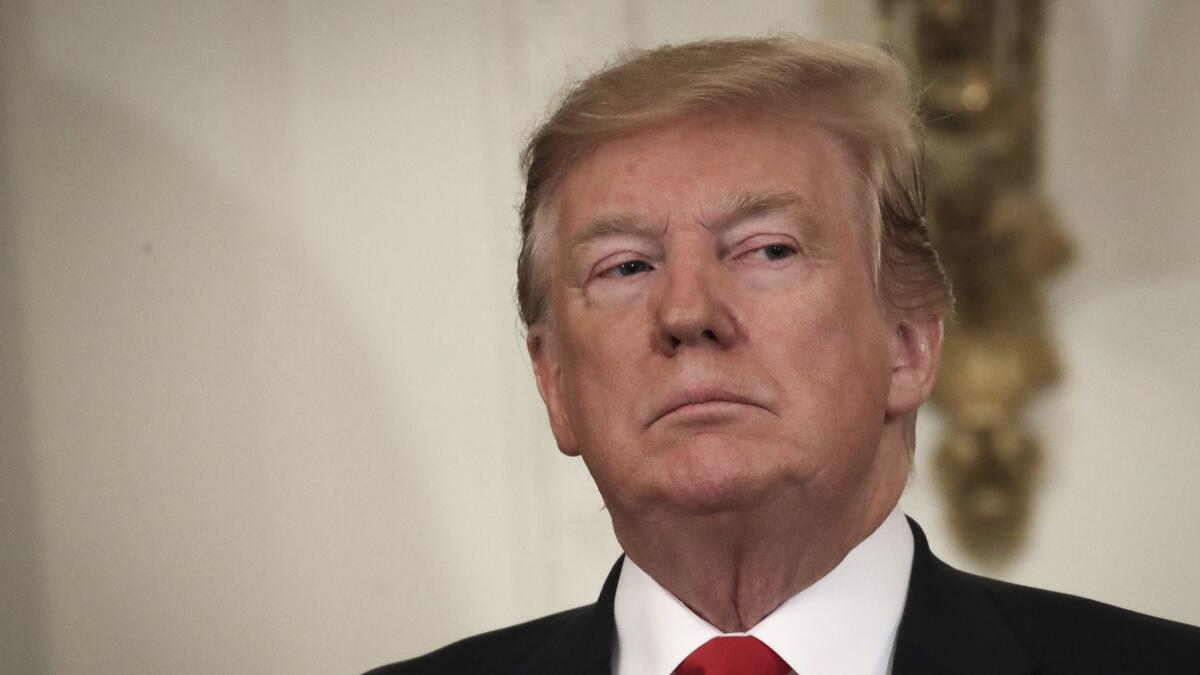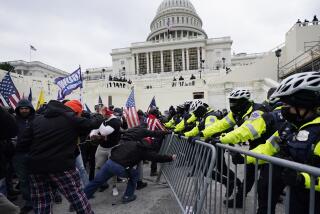Mueller decided not to subpoena Trump to avoid a lengthy court fight

Reporting from Washington — In the end, special counsel Robert S. Mueller III never forced President Trump to testify under oath even though he considered Trump’s written answers to prosecutors’ questions “inadequate.”
Instead of following predecessors who compelled evidence from President Nixon during Watergate, and President Clinton in a scandal over his personal behavior, Mueller chose not to subpoena Trump.
With the release Thursday of Mueller’s redacted report of his 22-month investigation, the question remains: Why did Mueller forgo forcing Trump to testify about 10 incidents that came close to — and may have crossed the line into — unlawfully obstructing the probe?
At his news conference Thursday, Atty. Gen. William Barr said the White House “fully cooperated” with the investigation and provided “unfettered access” to internal documents. He said Trump at no point “deprived the special counsel of the documents and witnesses necessary to complete his investigation.”
Barr added, “this evidence of non-corrupt motives weighs heavily against any allegation that the president had a corrupt intent to obstruct the investigation.”
Full coverage: Robert Mueller finishes his investigation into President Trump’s 2016 campaign »
Yet Trump, through his lawyers, rebuffed Mueller’s repeated attempts to secure his voluntary sworn testimony. And although Trump responded to some questions submitted in writing, “he did not similarly agree” to answer any regarding “obstruction topics,” according to Mueller’s report.
Some legal experts said Trump’s intent, “corrupt” or otherwise, may be impossible to discern because he was never compelled to explain his actions under oath.
“Whatever truth it would have induced him to tell, whatever force it might have had on Donald Trump not to break the law by being under penalty of perjury, the American people literally will never hear now,” said Harry Litman, a former U.S. attorney in Pittsburgh who teaches constitutional law at UCLA.
Charles M. Kagay, who served as chief appellate lawyer for an independent counsel investigation of a Clinton administration Cabinet secretary, said Trump’s intentions would best be evaluated through his own, sworn testimony.
“I think for most prosecutors, the oral testimony of the witness is the gold standard … particularly a situation where you have an individual [Trump] who often denies things that others said he said,” Kagay said.
According to his report, Mueller’s team believed it had the authority and legal justification to issue a grand jury subpoena to obtain the president’s testimony. But Mueller “chose not to do so” because of the prospect of a protracted legal challenge from Trump’s lawyers.
“We made that decision in view of the substantial delay that such an investigative step would likely produce at a late stage in our investigation,” the report states.
Mueller’s team “sought for more than a year to interview the President on topics relevant to both Russian-election interference and obstruction-of-justice,” it adds.
In March 2018, Mueller broached the possibility with Trump’s lawyers of issuing the grand jury subpoena. But he never sought to enhance his leverage with Trump by obtaining the subpoena, and gave only a brief explanation of his reasoning in the report.
“Recognizing that the President would not be interviewed voluntarily, we considered whether to issue a subpoena for his testimony,” it states.
“We viewed [Trump’s] written answers to be inadequate. But at that point, our investigation had made significant progress and had produced substantial evidence for our report. We thus weighed the costs of potentially lengthy constitutional litigation, with resulting delay in finishing our investigation, against the anticipated benefits for our investigation and report.”
Earlier prosecutors had proceeded differently with Nixon and Clinton.
In July 1974, the Supreme Court unanimously upheld a subpoena, ordering Nixon to provide the Watergate special prosecutor taped Oval Office conversations and other materials. The tapes helped seal Nixon’s doom, and he resigned the next month.
In 1998, Kenneth W. Starr, who investigated Clinton’s financial dealings and his affair with a White House intern, negotiated for months to question the president under oath. That July, Starr obtained a subpoena to compel Clinton to testify before a grand jury. No sitting president had ever done so.
Clinton promptly agreed to testify if Starr withdrew the subpoena, which he did. Starr’s subsequent report to Congress accused Clinton of giving “perjurious, false and misleading testimony.”
“Whatever the legal arguments, a president never likes to say, ‘I’m defying a grand jury subpoena,’” said Solomon L. Wisenberg, a deputy to Starr who led the questioning of Clinton on Aug. 17, 1998, adding that “absolutely, unquestionably,” the subpoena prompted Clinton’s testimony.
W. Neil Eggleston, who was hired in the 1990s to challenge an independent counsel’s subpoena for White House records related to an investigation of Clinton’s Agriculture secretary, said Trump’s oral testimony would have provided the best evidence of why he took certain actions.
“The fact that other people may have told the special counsel what they thought about what President Trump was up to, for example, in firing [FBI Director James] Comey, is all interesting,” Eggleston said. “But the only person who actually knows is the president.’’
Eggleston would not, he said, fault Mueller’s decision to forgo subpoenaing Trump without knowing all the information available to the special counsel.
Times staff writer Chris Megerian contributed to this report.
More to Read
Get the L.A. Times Politics newsletter
Deeply reported insights into legislation, politics and policy from Sacramento, Washington and beyond. In your inbox three times per week.
You may occasionally receive promotional content from the Los Angeles Times.











